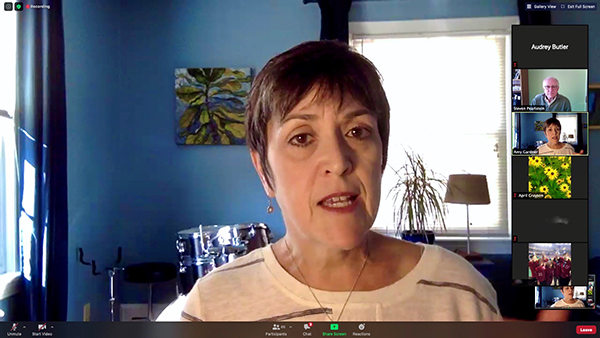Originally published on October 8, 2020
What is the job of a political reporter in an age of widely spread “fake news”?
“It is our job to tell the truth,” said Amy Gardner, who covers national politics for the Washington Post. Easy, right?
Sharing and consuming news has come a long way over the course of the past few political campaigns, where bias competes with accuracy for the spotlight, and every week seems to come with a new headline scandal that had been covered up by officials in public office. As Gardner detailed in her conversation with Mason Robinson Professor of Public Policy Steven Pearlstein in the First Tuesday series of webinars, many depend on newspapers to stay up-to-date with crucial information in a time where “all norms have been shattered.”
See the recording of the conversation.
Gardner found her start working on the newspaper at the University of Pennsylvania, where she was a history major, after which she progressed to reporting for small newspapers in New York and North Carolina. After a stint working in Newport News, Va., she was offered a job at the Washington Post.
“You have to be hungry and have an appetite for news,” Gardner said. “I find myself driven by this hunger to get a story, to beat the competitors, to signal to the sources that I’m the one who’s on it and who knows it best.”
As she goes into investigating a story, Gardner prioritizes honesty and clarity in her interviews. “Getting it right is not just quoting the words verbatim—that is important—but it’s also putting those words in an accurate context and a fair context,” Gardner explained, warning against taking risks at misrepresenting what someone may confide to her about.
However, representing, let alone finding, the truth in the current state of events provides its own challenge, as both media and the general public witnessed through the course of the presidential election in 2016, when Donald Trump had not seemed the likely victor the month prior to the announcement.
“The biggest challenge is to know what’s really going on,” she said. “We all thought we knew what was going on in October 2016 and we were wrong… It forced a reckoning of how we covered the race, who we had spoken to, and why we had missed this surge of disaffection and grievance and upset with the status quo that pushed Donald Trump into office.”
“You miss [information] by not being out in the state, or the country, or the battle grounds talking to people,” Gardner said, offering the importance of first-hand experiences to avoid misleading coverage.
Looking forward to the upcoming November election, Gardner warned the media to practice caution with declaring the victor on election night.
“It would be grossly irresponsible for networks to call races with that kind of uncertainty,” she explained, drawing attention to the chance of ballots taking longer to count due to increased mail-in voting during the pandemic. In terms of how the Washington Post will be reporting on the result of the election, Gardner emphasized, “We don’t need to be first, we need to be right.”
First Tuesday continues with U.S. Rep. Jennifer Wexton (D) October 13 at 9 a.m. The series, sponsored by the Honors College and the Schar School of Policy and Government, is open to the Mason community.

